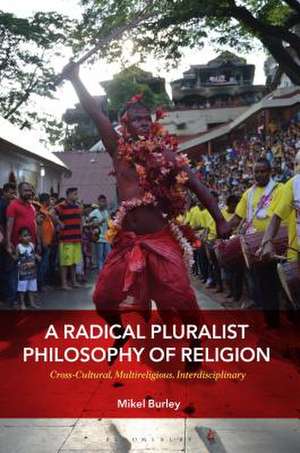A Radical Pluralist Philosophy of Religion: Cross-Cultural, Multireligious, Interdisciplinary
Autor Dr. Mikel Burleyen Limba Engleză Paperback – 22 ian 2020
| Toate formatele și edițiile | Preț | Express |
|---|---|---|
| Paperback (1) | 161.32 lei 3-5 săpt. | |
| Bloomsbury Publishing – 22 ian 2020 | 161.32 lei 3-5 săpt. | |
| Hardback (1) | 498.66 lei 6-8 săpt. | |
| Bloomsbury Publishing – 22 ian 2020 | 498.66 lei 6-8 săpt. |
Preț: 161.32 lei
Preț vechi: 196.65 lei
-18% Nou
Puncte Express: 242
Preț estimativ în valută:
30.87€ • 32.19$ • 25.66£
30.87€ • 32.19$ • 25.66£
Carte disponibilă
Livrare economică 27 februarie-13 martie
Preluare comenzi: 021 569.72.76
Specificații
ISBN-13: 9781350098312
ISBN-10: 1350098310
Pagini: 264
Dimensiuni: 156 x 234 x 23 mm
Greutate: 0.43 kg
Editura: Bloomsbury Publishing
Colecția Bloomsbury Academic
Locul publicării:London, United Kingdom
ISBN-10: 1350098310
Pagini: 264
Dimensiuni: 156 x 234 x 23 mm
Greutate: 0.43 kg
Editura: Bloomsbury Publishing
Colecția Bloomsbury Academic
Locul publicării:London, United Kingdom
Caracteristici
Includes provocative and original discussions of modes of religious life such as animal sacrifice and cannibalism
Notă biografică
Mikel Burley is Associate Professor of Religion and Philosophy at the University of Leeds, UK. His previous books include Rebirth and the Stream of Life: A Philosophical Study of Reincarnation, Karma and Ethics (2016) and Contemplating Religious Forms of Life: Wittgenstein and D. Z. Phillips (2012).
Cuprins
List of IllustrationsAcknowledgementsIntroductionIntroducing a Radical Pluralist ApproachChapter SummariesPART I: CRITIQUE AND METHODOLOGY1. Religious PluralismsJohn Hick's Pluralistic HypothesisReductive and Homogenizing Implications of Hick's ApproachJohn Cobb's Vision of Creative TransformationVictoria Harrison's Internalist PluralismA Difficulty with the Internalist PictureWorking with ExamplesConceptual Schemes, Incomprehensibility and RespectConcluding Remarks2. Radical Plurality and Critical DescriptionShortcomings of Contemporary Philosophy of ReligionExpansive Innovations and Residual LimitationsDescription's Critical PotentialDefamiliarization and Cultural Critique in AnthropologyThickening Description3. Narrative Fiction and Philosophical InquiryNarrative Fiction and Competing Conceptions of Philosophical ReasoningPhilosophers and DramatistsNarrative Fiction as Philosophy of ReligionWole Soyinka's Death and the King's HorsemanDeath and the King's Horseman as Philosophy of ReligionConcluding RemarksPART II: EXEMPLIFYING A RADICAL PLURALIST APPROACH4. 'Compassion beyond Our Imagination': Radical Plurality in Buddhist EthicsVarieties of Buddhism and the Rhetoric of CompassionImages of Familial Love and AbandonmentBodily Sacrifice as Heroic Virtue'Lamps of Their Precious Bodies'Transgressive Compassion and Skilful MeansConcluding Remarks5. 'Ways of Being Human': Cannibalism and Respecting the DeadEating Animals but Not Eating People?Varieties of CannibalismWari' Ways of Respecting the DeadConcluding Remarks6. 'Awe at the Terrible': Divine Possession, Blood Sacrifice and the Grotesque BodyPreamble: Studying Ritual PhilosophicallyThe Grotesque'Horrific Comedy' and the Formation of a Ritual Sound-WorldKamakhya, Desire and the Womb of the GoddessDeodhas and DeitiesRitualized Transgression and the Performance of Divine PossessionConcluding Remarks7. 'A Language in Which to Think of the World': Animism, Philosophy and Indigenous TraditionsThe Concept of Animism: Origins, Decline and RevivalAnimism, Indigeneity and the Philosophy of ReligionBeyond Literalism and MetaphorDemythologizing the 'Ecologically Noble Savage'Concluding Remarks8. Conclusions: Loosening Up Our LivesAttending to Heterogeneity and Thickening DescriptionTargeting Overgeneralizing Claims and AssumptionsImagining Philosophy of Religion DifferentlyReferencesIndex
Recenzii
Burley's book is well written, provocative, and engaging, and it certainly deserves to be read by anyone who is serious about developing a pluralistic philosophy of religion. Furthermore, since it includes generous summaries and critiques of some other important attempts, the book would be well suited to a class or to anyone wanting to get caught up on the subject.
With sensitivity to cultural difference and to our own biases, Mikel Burley offers a Wittgensteinian approach that takes seriously religious practices from all around the world. Among those who turn to a global philosophy of religion, this is the best book I know for the university classroom.
Mikel Burley has done something truly remarkable. By articulating a conception of the radically plural nature of religious phenomena and by extended reflection on ethnographic material drawn from outside the mainstream theistic tradition (cannibalism, animism, the grotesque), he has added a new and exciting dimension to the philosophy of religion. Burley is also to be commended for adding new life to the Wittgensteinian approach to religion. A thought-provoking, trailblazing, and deeply important book.
Mikel Burley's book both unifies and extends his valuable work on diversification in philosophy of religion.
With sensitivity to cultural difference and to our own biases, Mikel Burley offers a Wittgensteinian approach that takes seriously religious practices from all around the world. Among those who turn to a global philosophy of religion, this is the best book I know for the university classroom.
Mikel Burley has done something truly remarkable. By articulating a conception of the radically plural nature of religious phenomena and by extended reflection on ethnographic material drawn from outside the mainstream theistic tradition (cannibalism, animism, the grotesque), he has added a new and exciting dimension to the philosophy of religion. Burley is also to be commended for adding new life to the Wittgensteinian approach to religion. A thought-provoking, trailblazing, and deeply important book.
Mikel Burley's book both unifies and extends his valuable work on diversification in philosophy of religion.
